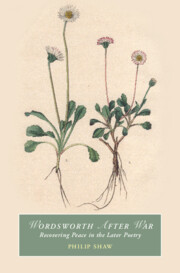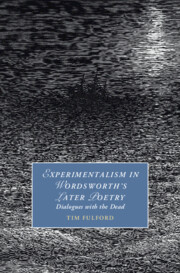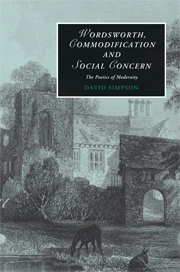Wordsworth After War
Recovering Peace in the Later Poetry
$110.00 USD
Part of Cambridge Studies in Romanticism
- Author: Philip Shaw, University of Leicester
- Date Published: July 2023
- availability: This ISBN is for an eBook version which is distributed on our behalf by a third party.
- format: Adobe eBook Reader
- isbn: 9781009363174
Find out more about Cambridge eBooks
$
110.00 USD
Adobe eBook Reader
Other available formats:
Hardback
Looking for an inspection copy?
This title is not currently available on inspection
-
William Wordsworth's later poetry complicates possibilities of life and art in war's aftermath. This illuminating study provides new perspectives and reveals how his work following the end of the revolutionary and Napoleonic wars reflects a passionate, lifelong engagement with the poetics and politics of peace. Focusing on works from between 1814 and 1822, Philip Shaw constructs a unique and compelling account of how Wordsworth, in both his ongoing poetic output and in his revisions to earlier works, sought to modify, refute, and sometimes sustain his early engagement with these issues as both an artist and a political thinker. In an engaging style, Shaw reorients our understanding of the later writings of a major British poet and the post-war literary culture in which his reputation was forged. This title is part of the Flip it Open Programme and may also be available Open Access. Check our website Cambridge Core for details.
Read more- Sets out a chronological account of the development of Wordsworth's later poetry, focusing on works written or published between 1814 and 1822
- Demonstrates how Wordsworth's poetry responds to the aftermath of the revolutionary and Napoleonic wars and sustained, modified, or rejected his early engagement with the poetics and politics of peace
- Challenges the distinction between 'early' and 'late' Wordsworth, exploring the poet's revisions to earlier works and the significance of the reception of these works following their publication in the post-war period
Reviews & endorsements
'… this is a book of richly detailed readings of lesser-known poems that consistently illuminates their inner tensions by reconstructing the personal and public contexts in which they were written and read. ' Tim Fulford, The Charles and Mary Lamb Journal
Customer reviews
Not yet reviewed
Be the first to review
Review was not posted due to profanity
×Product details
- Date Published: July 2023
- format: Adobe eBook Reader
- isbn: 9781009363174
- availability: This ISBN is for an eBook version which is distributed on our behalf by a third party.
Table of Contents
Introduction
1. Conscripting 'The Recluse'
2. Peace out of time: The White Doe of Rylstone
3. Thanksgiving after war
4. 'Returning, like a ghost unlaid': Peter Bell and The Waggoner
5. Violent waters: The River Duddon and Ecclesiastical Sketches
6. Wordsworth after Byron: Memorials of a Tour on the Continent, 1820
After Wordsworth.
Sorry, this resource is locked
Please register or sign in to request access. If you are having problems accessing these resources please email [email protected]
Register Sign in» Proceed
You are now leaving the Cambridge University Press website. Your eBook purchase and download will be completed by our partner www.ebooks.com. Please see the permission section of the www.ebooks.com catalogue page for details of the print & copy limits on our eBooks.
Continue ×Are you sure you want to delete your account?
This cannot be undone.
Thank you for your feedback which will help us improve our service.
If you requested a response, we will make sure to get back to you shortly.
×



